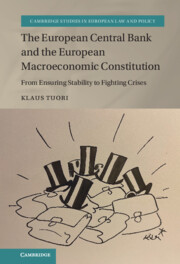 The European Central Bank and the European Macroeconomic Constitution
The European Central Bank and the European Macroeconomic Constitution Book contents
- The European Central Bank and the European Macroeconomic Constitution
- Cambridge Studies in European Law and Policy
- The European Central Bank and the European Macroeconomic Constitution
- Copyright page
- Contents
- Figures
- Series Editors’ Preface
- Preface and Acknowledgements
- Abbreviations
- 1 Introduction: A Supranational Central Bank as a Subject
- Part I The ECB as the Central Bank of the European Macroeconomic Constitution
- Part II Crises, ECB Measures and the Macroeconomic Constitution
- 5 ECB Monetary Policy during the Financial Crisis
- 6 The Prelude to the Sovereign Debt Crisis: Events, ECB Verbal Interventions and EU Rescue Programmes
- 7 Selective Government Bond Purchases
- 8 The ECB’s Quantitative Easing
- 9 The Banking Union: The ECB Takes Over Banking Supervision
- 10 ECB Measures during the Covid-19 Pandemic
- Part III The ECB from a Central Bank of Stability to a Central Bank of Crisis
- Bibliography
- Index
8 - The ECB’s Quantitative Easing
from Part II - Crises, ECB Measures and the Macroeconomic Constitution
Published online by Cambridge University Press: 15 September 2022
- The European Central Bank and the European Macroeconomic Constitution
- Cambridge Studies in European Law and Policy
- The European Central Bank and the European Macroeconomic Constitution
- Copyright page
- Contents
- Figures
- Series Editors’ Preface
- Preface and Acknowledgements
- Abbreviations
- 1 Introduction: A Supranational Central Bank as a Subject
- Part I The ECB as the Central Bank of the European Macroeconomic Constitution
- Part II Crises, ECB Measures and the Macroeconomic Constitution
- 5 ECB Monetary Policy during the Financial Crisis
- 6 The Prelude to the Sovereign Debt Crisis: Events, ECB Verbal Interventions and EU Rescue Programmes
- 7 Selective Government Bond Purchases
- 8 The ECB’s Quantitative Easing
- 9 The Banking Union: The ECB Takes Over Banking Supervision
- 10 ECB Measures during the Covid-19 Pandemic
- Part III The ECB from a Central Bank of Stability to a Central Bank of Crisis
- Bibliography
- Index
Summary
The ECB started its QE called the PSPP in 2015 as a new monetary policy measure. By purchasing vast monthly amounts of main Member State government bonds, the ECB aimed to force investors towards riskier assets, which in turn, was to increase asset prices and support bank lending, and ultimately lead to growth and inflation. Constitutionally, QE was a new type of complication for the European Macroeconomic Constitution. The ECB became the largest creditor of Member States it was prohibited to finance. The constitutional assessment of the PSPP combines the analysis of the CJEU’s Weiss case that contains very limited constraints for the ECB, and more economic-constitutional and thus substantive analysis. One key question is whether the PSPP is monetary policy, which can be analysed through its objectives, its economic content and examples of other central banks that mostly support an affirmative conclusion. The euro area constitutional structure adds further complications that were also raised in the FCC’s Weiss judgment. The PSPP has arguably broader implications for other areas of economic policy, as it facilitates Member States public finances and increases wealth differences by increasing asset prices, as well as making the ECB deeply dependent on Member States public finances.
Keywords
- Type
- Chapter
- Information
- The European Central Bank and the European Macroeconomic ConstitutionFrom Ensuring Stability to Fighting Crises, pp. 193 - 214Publisher: Cambridge University PressPrint publication year: 2022


